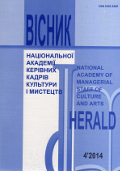RECITATION-GENRE TO MUSIC IN UKRAINIAN ROCK-MUSIC
DOI:
https://doi.org/10.32461/2226-3209.4.2014.138308Keywords:
recitation-genre rock-music, rock culture, poetry, modern Ukrainian literatureAbstract
A characteristic feature of rock culture, despite the seemingly nihilistic its nature, is the integration of the experience of other cultures and different arts. The rock musicians address classical and folklore music, poetry and theater as a guarantee of quality at the expense of such permanent makeup, and its existence at all. The purpose of this publication is to study the genre's recitation of music in the modern Ukrainian rock music.
Today one of borrowed rock music phenomenon is recitation of music – reading poems to music. This concert genre is the most appropriate for the modern Ukrainian rock, the recitation of music, appearing in theatrical environments, evolving phenomenon of academic tradition, has great potential to enrich the rock art.
Experiments involving seemingly foreign to the rock art genres and forms were almost immediately after the emergence of rock music. For example, such genres as rock opera and concept album (which originated from the instrumental and vocal cycles Romantic era), appear less than a decade after the first rock 'n' roll.
Today in Ukraine there are many examples of poetic rock tandems, the best of which we believe are common creative of Yuriy Andruhovych and band "Karbido", Sergiy Zhadan and the band "Sobaky v Kosmosi", Yuriy Izdryk and the "Drumtyatr", Artem Polezhaka with the band "Barabas".
The result of collaboration Yuriy Andruhovych with polish band "Karbido", (their music is not the only rock) appears as a triptych of albums "Moonshine. Cinnamon. Absinthe ", written and published in 2008, 2009 and 2011. The first album of cycle, which has Ukrainian and Polish versions, is a monolithic and consists of nine tracks.All poems included in the album are free verse that sound during meditative, minimalistic accompaniment. Poetic material for the album "Cinnamon" is taken from the book "Exotic birds and plants" and, unlike the previous one, consists of accentual-syllabic verse. At the same time, the musical language of the cycle is complicated and significantly expands the style aspect. The final part of the series "Moonshine. Cinnamon. Absinthe" is the clearest example of the use polystylism in trilogy.
The results of the creative tandem of Sergiy Zhadan and the group "Sobaky v kosmosi" at this moment just deducted three albums (respectively – three concert programs): "Sports Club of the Army" (2008), "The weapon of the proletariat" (2012) and "Fight for Her" (2014). "Sports Club of the Army" consists of seven verses and the final number "Galya" performed by female folk Ukrainian song "Why do not you come." Most of the poems of Sergiy Zhadan, which were included in the album, are free verse, which reading on the background of primitive music parody (Zvenimir Babak), nostalgic ("Nataha"), dance ("Boxers") or mock-mourning ("Dimple") character. The album "Sports Club of the Army" is social in content. Sergiy Zhadan describes stories of addicts, migrant workers, athletes, poets as typical representatives of modernity. If the "Sports Club of the Army" consists almost entirely of free verse, the next two albums based purely on rhyming poetic material. In general, "Weapon of the proletariat" (2012) and "Fight for Her" (2014) are similar in structure and content and have distinct political content, with introduction of variable-improvised topical text, depending the time and place of performance of the band, and an unexpected ending.
The poet Yuriy Izdryk picked general wave of interest literary and musical projects in 2010 with musician Gregory Semenchuk founded the project "Drumtyatr" in which he not only reads poetry, but also plays the bass guitar. An exceptional musicality Izdryk's manner of writing (especially since poetry), his meditative style reading wonderfully combined with a mixed style of music. "Drumtyatr", that has features electronic music, kraut rock, post-rock, rap and dubstep.
In 2011 was released a joint album of poet Artem Polezhaka and band "Barabas" called "Spring. Love. Polezhaka", where there is a strengthened role of music (compared with projects Y. Andruhovych and S. Zhadan). Increased interest of poetry plenty of audience in different periods, leading at first to its public readings (concert performance poetry), and then – to new forms of synthesis with other arts, particularly music. Native poets actively work with rock musicians in the form of readings of poems to music.
Most supporters of collaboration with musical bands were representatives of the "first tier" of modern Ukrainian literature by Ivano-Frankivsk (Y. Andruhovych and Y. Izdryk) and Kharkov (S. Zhadan and A. Polezhaka) schools. Poets in similar projects use as accentual-syllabic verse and free verse (even if they are not typical for them, as is the case with Artem Polezhaka).
Reading poems to music in modern terms-round attraction to synthesize a variety of genres, styles and forms of art has a great potential and broad prospects for development.Downloads
Published
Issue
Section
License
Authors who publish with this journal agree to the following terms:
1. Authors retain copyright and grant the journal right of first publication with the work simultaneously licensed under a Creative Commons Attribution License International CC-BY that allows others to share the work with an acknowledgement of the work's authorship and initial publication in this journal.
2. Authors are able to enter into separate, additional contractual arrangements for the non-exclusive distribution of the journal's published version of the work (e.g., post it to an institutional repository or publish it in a book), with an acknowledgement of its initial publication in this journal.
3. Authors are permitted and encouraged to post their work online (e.g., in institutional repositories or on their website) prior to and during the submission process, as it can lead to productive exchanges, as well as earlier and greater citation of published work (See The Effect of Open Access).


